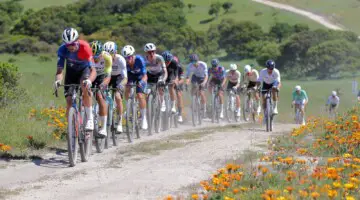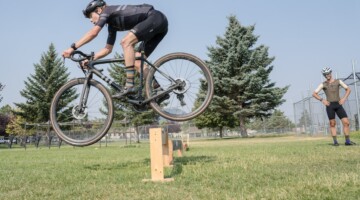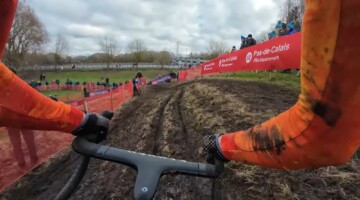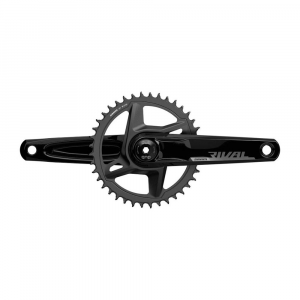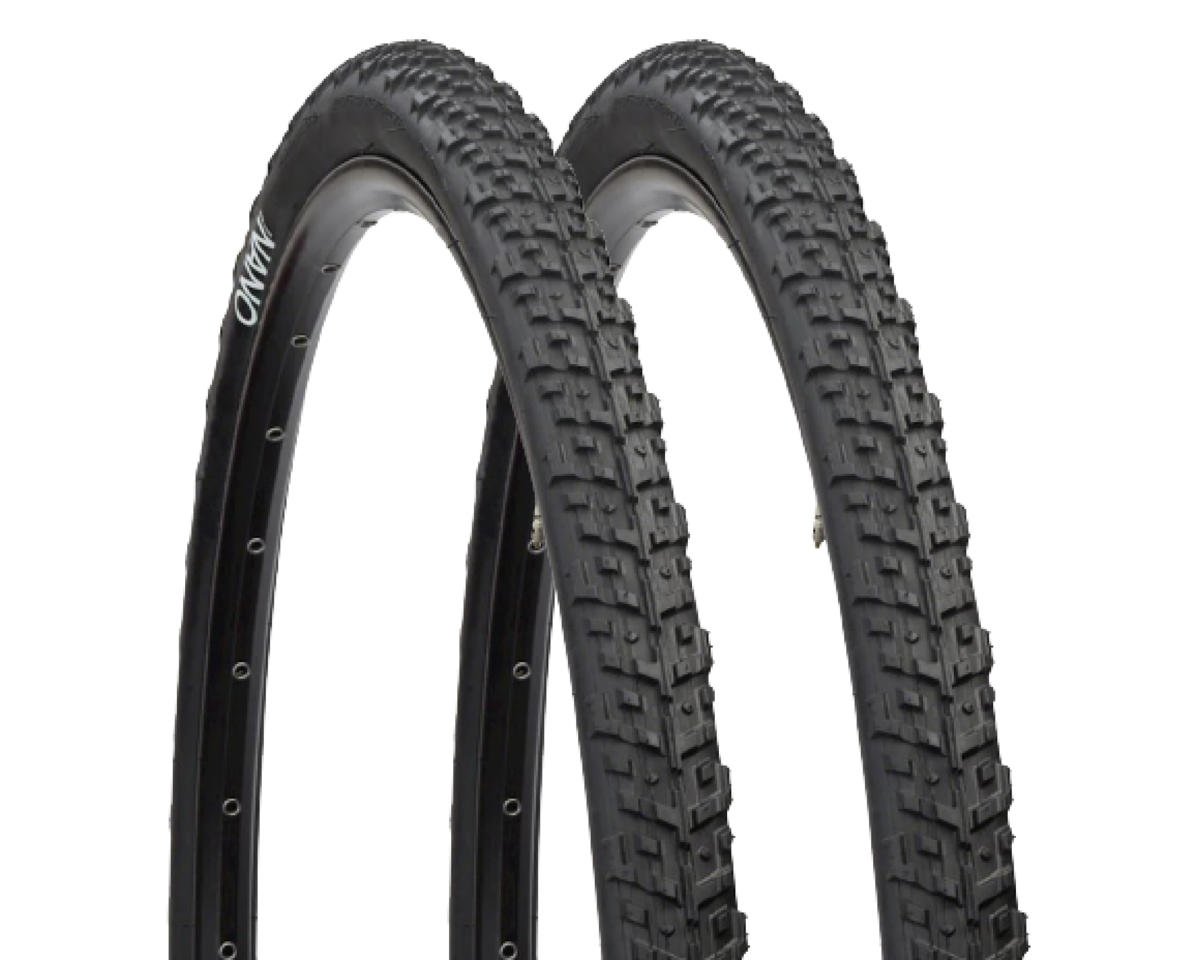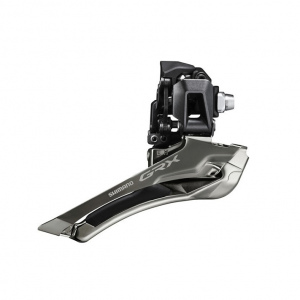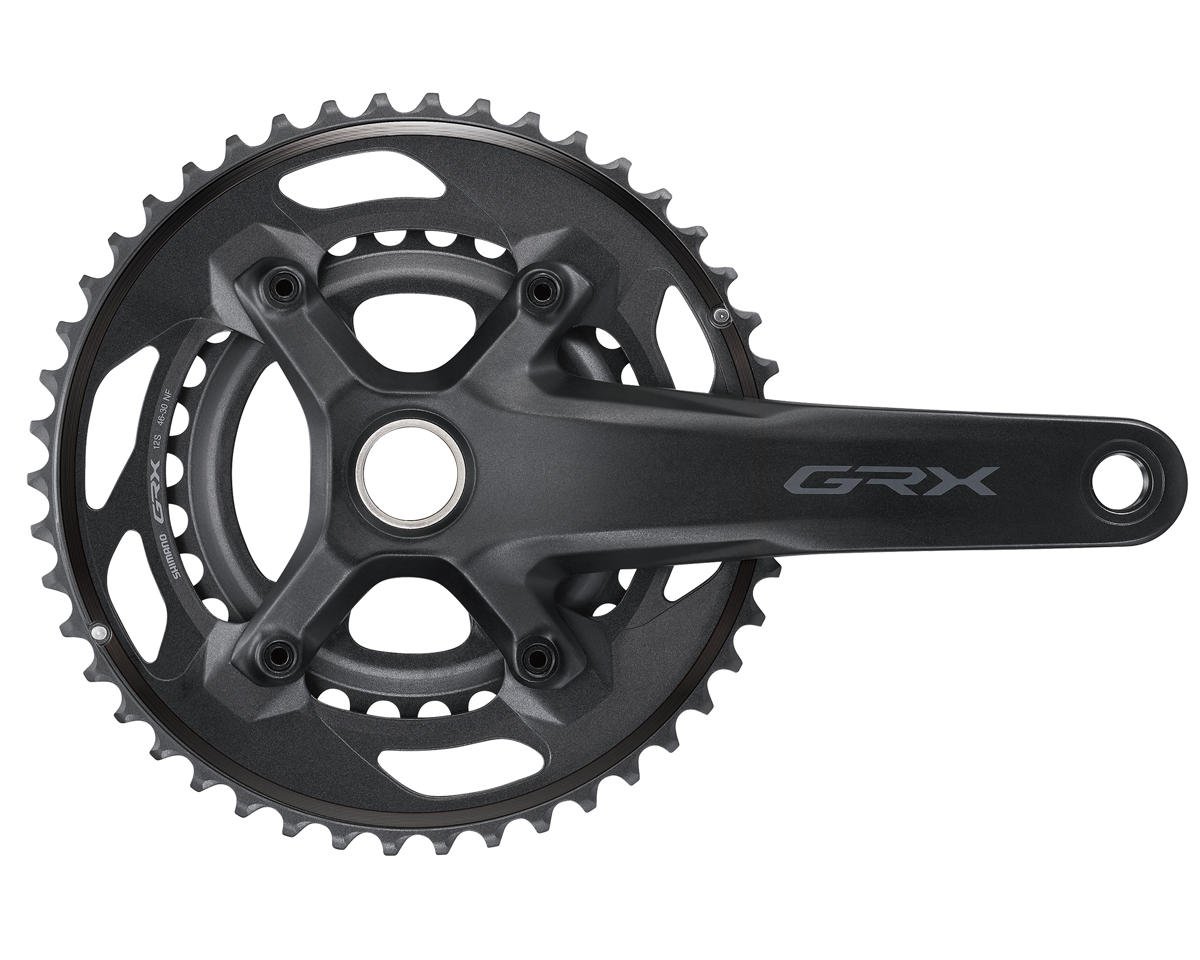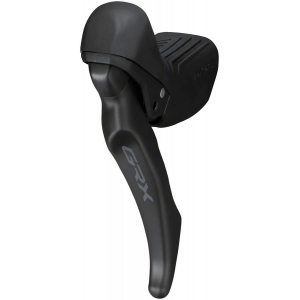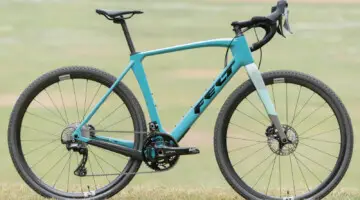
Coverage of 2018 Worlds is brought to you in part by Julbo Eyewear. Check out the glasses that National Champion Stephen Hyde wears.
It’s a predictable pattern. The morning after a title event, athletes, fans, pundits and journalists play Monday morning quarterback and reconsider a coach’s personnel decisions, the air pressure in equipment as well as cleat and tread choices.
Sure, Belgian team manager Sven Vanthourenhout’s choice of picking a young team and excluding last year’s bronze medalist seems to have worked out just fine, and we won’t really know if anything was underinflated or whose shoes were underspiked in Valkenburg, but tread choice? We’re always happy to geek out there.
Cant Starts the Switcheroo
After Wout van Aert’s success running dual casing tubulars and old green Michelin clincher treads at the 2017 Cyclocross World Championships, there was much talk about tire choice coming into the epically muddy 2018 Championships in Valkenburg-Limburg.
Van Aert’s coach Niels Albert threw more burning rubber into the fire earlier last week, stating that they were working on a special tire for Worlds.
Yet, before Sunday had even arrived, there was already talk about unconventional tire choices winning the World Championships. After Saturday’s three races were over, there was only one title-winning tire: the Challenge Limus.
While riders using the Limus, Challenge’s main mud tread (and past Editors’ Choice winner), shouldn’t be a surprise in such muddy conditions, it was a bit of a surprise to see Sanne Cant lining up in Valkenburg-Limburg with the tires.
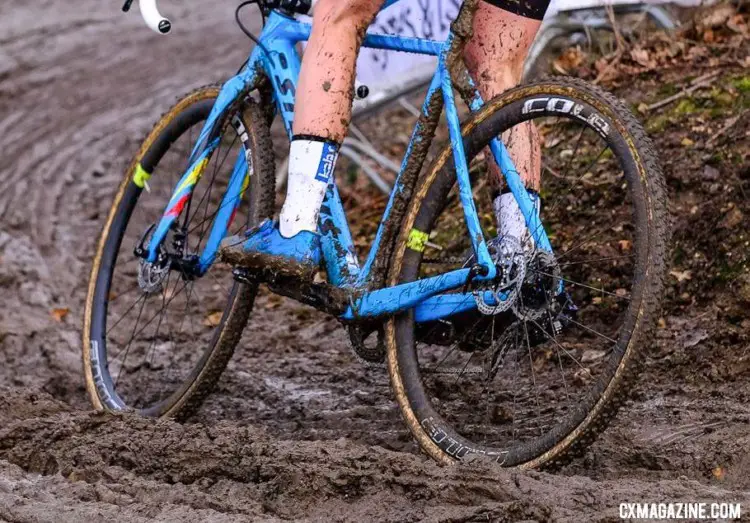
Sanne Cant normally rides FMB but swapped them for Challenge Limus on Saturday to battle Compton and defend her jersey. 2018 UCI Cyclocross World Championships, Valkenburg-Limburg, The Netherlands. © Gavin Gould / Cyclocross Magazine
After Katie Compton and Sanne Cant escaped their competitors and set up for a thrilling two-woman battle, we believe it was already a foregone conclusion that a Challenge Limus would sweep the day’s titles. Compton swapped to Challenge from Donnelly at the turn of the year.
However, Cant normally rides FMB tubulars mounted to her Cole wheels, and earlier this season we got a close look at her dry conditions tire choice:
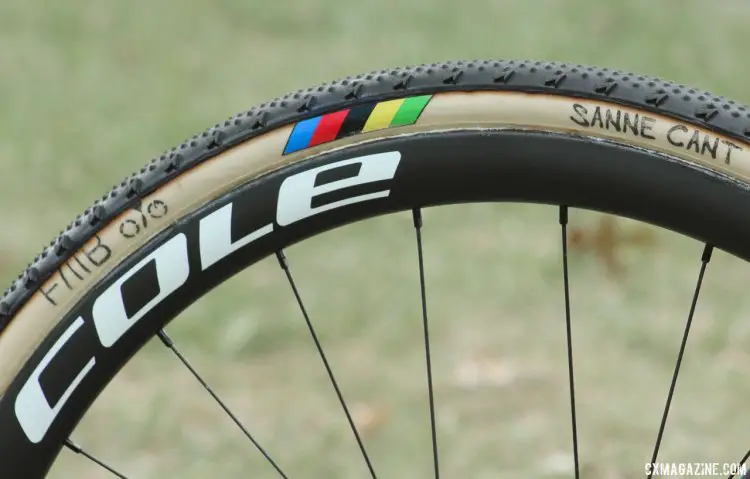
Sanne Cant uses Cole carbon tubular wheels and FMB tubulars. On race day, she had a choice between Sprint 2 (shown here) and Slalom treads. Cant’s World Cup Waterloo-winning Stevens Super Prestige cyclocross bike. © Z. Schuster / Cyclocross Magazine
Although FMB released a new mud tread this past season, which look remarkably similar to Van Aert’s winning Mud tires from last year, Cant did not roll on the new green rubber in Valkenburg:
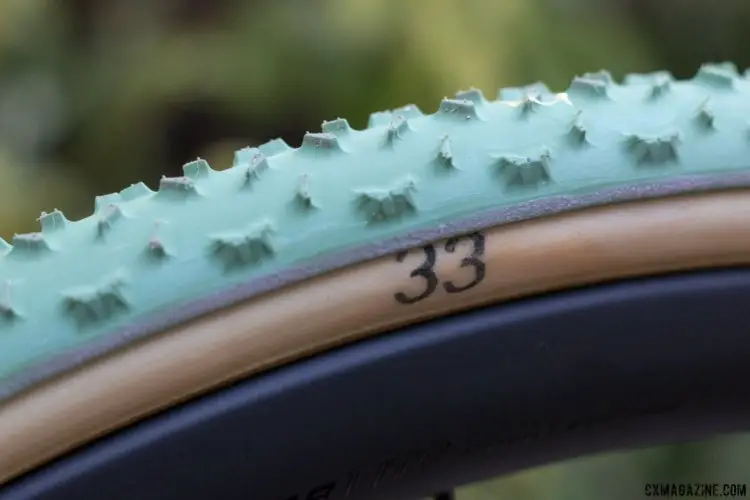
The upcoming FMB Grippo S silica mud tubular comes in 33mm and will be used by a few lucky racers this season before it’s widely available in December. © Cyclocross Magazine
Instead, after trying the heavily-knobbed Challenge Limus in pre-ride, Cant swapped to them for her title defense.
Either Compton or Cant seemed destined to continue the string of victories already set by the young Brits in the morning with Ben Tulett’s Junior Men’s win and Evie Richard’s title-reclaiming ride on Limus earlier in the day.
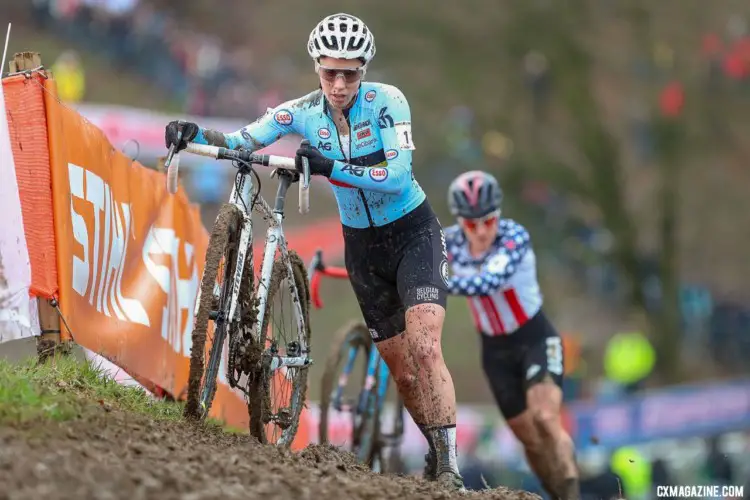
Sanne Cant and Katie Compton had a memorable battle for the win at Valkenburg. Elite Women. 2018 UCI Cyclocross World Championships, Valkenburg-Limburg, The Netherlands. © Bart Hazen / Cyclocross Magazine
Sloppy Sunday Has Van Der Poel Second Guessing
Before the final race kicked off on Sunday, after Eli Iserbyt’s win on Limus in the U23 Men’s race, most money was unknowingly on a Challenge Limus to sweep all five races.
Did the previous four wins on a single tread call for a last-minute switch by Mathieu van der Poel, the pre-race favorite?
Van der Poel, who normally rides Dugast, defended his choice of using his normal Rhino mud tires in 2017 in Bieles after his multiple flats.
“These are the tires I ride on the whole year, and I don’t know why I should change it for one particular race.” -Mathieu van der Poel after his four flat tires at the 2017 Worlds.
When he took the start this past Sunday, it appeared that he had reconsidered that use-only-what-you-know approach.
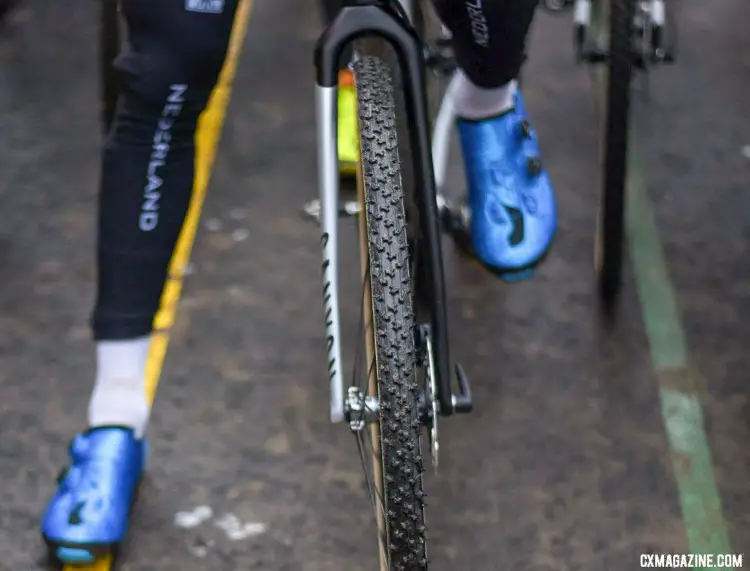
Van der Poel shed his normal Dugast Rhino tubulars for Challenge Limus for his Worlds race. The Limus had won the four earlier title races. 2018 UCI Cyclocross World Championships, Valkenburg-Limburg, The Netherlands. © Bart Hazen / Cyclocross Magazine
In Valkenburg-Limburg, Van der Poel lined up behind the rainbow striped start line with his rainbow jersey hopes also riding on Challenge Limus tubulars—the first time we’ve seem him do so—and likely a result of Cant’s choice and experience.
When defending his tire choice from last year, Van der Poel did hint that he could be convinced otherwise. “I make my own choice,” he explained. “I do what I think is best. If someone else has a good opinion I will follow it. I’m not too stubborn to see when someone else has a better idea than I have.”
Sanne Cant, who rides for Van der Poel’s Correndon Circus sister team, Iko Beobank, seemed to have a better, winning idea on Saturday.
It’s also worth noting that in Europe, most racers are not constrained by tire sponsorships like teams are in the States. In fact, many racers pay for their tires and ultimately have the option to ride anything.
Albert and Van Aert Downsize
Of course, Van der Poel wasn’t the only one to execute a tread swap. Van Aert and Albert sure talked up their tire game before Worlds.
While Albert has an extensive tire cellar, his master plan for Valkenburg-Limburg was rumored to be a Dugast-built tire based around a 26″ mountain bike tread for extra grip on the hilly, muddy course, according to Sunday’s UCI broadcast team of Anthony McCrossan and Simon Burney.
While it’s common for road racers to want to be as skinny as possible when a title is on the line, perhaps pushing the limits of a T.U.E. to do so, cyclocrossers often want to go the opposite direction with their tires, going fatter and up to the 33mm limit for better floatation over bumps, in the sand, and more contact with the ground.
However, Albert and Van Aert went through the effort to have the UCI pre-measure the mounted prototype tire, but apparently found it at the limits of the 33mm maximum width. So they went in the opposite direction.
In muddy, soft conditions, narrower tires have long been touted as a smart choice, especially years ago when frames’ mud clearance was minimal. A narrower tire offers more clearance inside the frame and fork, and in certain conditions, cuts through the slop and potentially has a better chance to get more bite into a harder surface below. Also, in the soft conditions, the shock absorption of higher-volume tires is unnecessary.
On Sunday, Van Aert told Cyclocross Magazine’s Corey Coogan Cisek another reason for picking narrower tires.
“I think I am one of the few guys in the peloton who likes to ride on narrow tires.”
Van Aert ran his normal Dugast Rhino tubulars in 30mm width. “I [ran] normal mud tires, but the only difference is I [ran] more narrow, so 30mm width.”
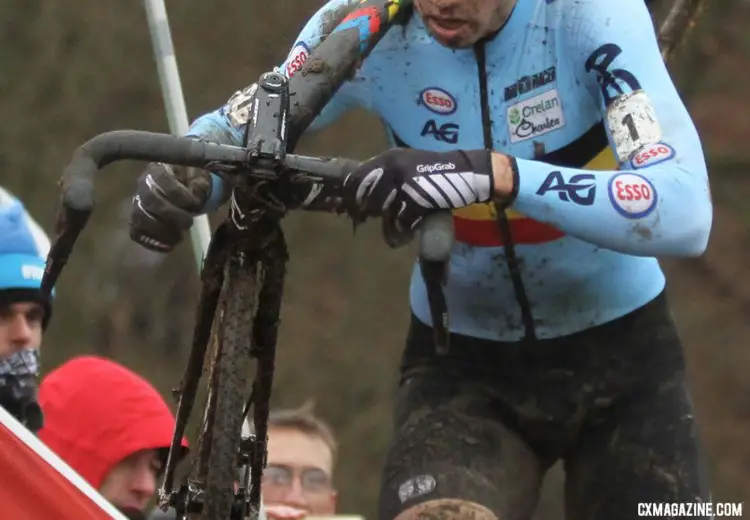
Wout Van Aert and Albert didn’t roll on their Dugast mtb-based prototypes but instead downsized to 30mm Dugast 30mm Rhino tubulars. 2018 UCI Cyclocross World Championships, Valkenburg-Limburg, The Netherlands. © Bart Hazen / Cyclocross Magazine
On the heavily rutted course, it’s arguable that Van Aert could slot into ruts with a bit less precision, and roll through them with a bit less friction and rolling resistance.
“I felt comfortable today in the ruts because [the tires] are more narrow than the rut actually is so you are more sliding through it.”
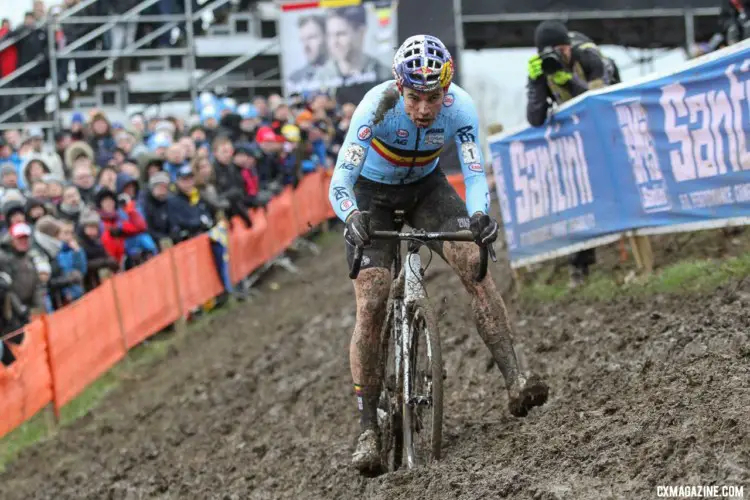
Wout van Aert kicks his way through the slick off-camber. Elite Men. 2018 UCI Cyclocross World Championships, Valkenburg-Limburg, The Netherlands. © Bart Hazen / Cyclocross Magazine
For the third time in the last four World Championships, Van Aert and Albert left no knob unturned as they considered their tires for Van Aert’s title defense, and based on their result, it’s hard to second-guess their choice.
Yet Van Aert isn’t quick to credit his choice with the win.
“I don’t know, but I think it wasn’t a story about tires this year,” he said.
“It was more a story about strong legs.”
We can’t argue with that.
For more from Valkenburg-Limburg, see our dedicated 2018 Cyclocross World Championships page.

